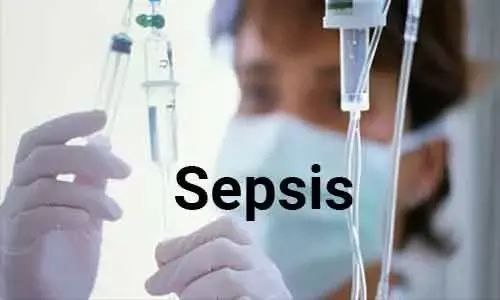- Home
- Medical news & Guidelines
- Anesthesiology
- Cardiology and CTVS
- Critical Care
- Dentistry
- Dermatology
- Diabetes and Endocrinology
- ENT
- Gastroenterology
- Medicine
- Nephrology
- Neurology
- Obstretics-Gynaecology
- Oncology
- Ophthalmology
- Orthopaedics
- Pediatrics-Neonatology
- Psychiatry
- Pulmonology
- Radiology
- Surgery
- Urology
- Laboratory Medicine
- Diet
- Nursing
- Paramedical
- Physiotherapy
- Health news
- Fact Check
- Bone Health Fact Check
- Brain Health Fact Check
- Cancer Related Fact Check
- Child Care Fact Check
- Dental and oral health fact check
- Diabetes and metabolic health fact check
- Diet and Nutrition Fact Check
- Eye and ENT Care Fact Check
- Fitness fact check
- Gut health fact check
- Heart health fact check
- Kidney health fact check
- Medical education fact check
- Men's health fact check
- Respiratory fact check
- Skin and hair care fact check
- Vaccine and Immunization fact check
- Women's health fact check
- AYUSH
- State News
- Andaman and Nicobar Islands
- Andhra Pradesh
- Arunachal Pradesh
- Assam
- Bihar
- Chandigarh
- Chattisgarh
- Dadra and Nagar Haveli
- Daman and Diu
- Delhi
- Goa
- Gujarat
- Haryana
- Himachal Pradesh
- Jammu & Kashmir
- Jharkhand
- Karnataka
- Kerala
- Ladakh
- Lakshadweep
- Madhya Pradesh
- Maharashtra
- Manipur
- Meghalaya
- Mizoram
- Nagaland
- Odisha
- Puducherry
- Punjab
- Rajasthan
- Sikkim
- Tamil Nadu
- Telangana
- Tripura
- Uttar Pradesh
- Uttrakhand
- West Bengal
- Medical Education
- Industry
Aminophylline reduces mortality risk in patients with septic shock

A recent study by Ruifang Zhang and peers found aminophylline to reduce the risk of death and prolong the survival time of patients with sepsis. The findings were published in Chinese Medical Journal.
Sepsis is a serious and potentially life-threatening condition that results from a severe infection. It can cause a range of symptoms and complications, including organ failure, septic shock, and death. Treatment for sepsis usually involves antibiotics and supportive care to help the body fight the infection and restore normal functioning. Recently, researchers have explored the use of aminophylline, a drug typically used for treating asthma and other respiratory conditions, as an adjunctive therapy for sepsis.
A clinical randomized controlled trial was conducted to evaluate the safety and efficacy of aminophylline in the treatment of sepsis. The trial involved 100 patients diagnosed with sepsis who were admitted to an ICU within 48 hours of diagnosis. The patients were randomly assigned in a 1:1 ratio to receive either standard therapy or standard therapy plus aminophylline. The primary clinical outcome was all-cause mortality at 28 days.
The findings of the study were:
Patients receiving aminophylline as an adjunctive therapy had a lower risk of death compared to those receiving standard therapy alone.
At 28 days, 14.0% of patients in the aminophylline group had died, compared to 32.0% in the control group.
Cox regression analysis showed that the aminophylline group had a lower hazard of death (hazard ratio = 0.312, 95% confidence interval: 0.129–0.753). In addition, patients in the aminophylline group had a longer survival time compared to the control group.
The study also showed that aminophylline had a time-dependent effect on vasopressor dose, oxygenation index, and sequential organ failure assessment score, with treatment.
However, there were no significant differences in total hospitalization days, ICU hospitalization days, or rates of serious adverse events between the two groups. Importantly, no adverse events were observed during the trial.
Source:
Zhang, R., Liu, H., Dai, D., Ding, X., Wang, D., Wang, Y., Shi, X., Zhang, S., Duan, X., Wang, H., Luo, Y., Liu, S., Han, B., Zhang, X., Fang, Y., Yang, J., Xu, W., & Sun, T. (2023). Adjunctive sepsis therapy with aminophylline (STAP): a randomized controlled trial. In Chinese Medical Journal: Vol. Publish Ahead of Print. Ovid Technologies (Wolters Kluwer Health). https://doi.org/10.1097/cm9.0000000000002282
Neuroscience Masters graduate
Jacinthlyn Sylvia, a Neuroscience Master's graduate from Chennai has worked extensively in deciphering the neurobiology of cognition and motor control in aging. She also has spread-out exposure to Neurosurgery from her Bachelor’s. She is currently involved in active Neuro-Oncology research. She is an upcoming neuroscientist with a fiery passion for writing. Her news cover at Medical Dialogues feature recent discoveries and updates from the healthcare and biomedical research fields. She can be reached at editorial@medicaldialogues.in
Dr Kamal Kant Kohli-MBBS, DTCD- a chest specialist with more than 30 years of practice and a flair for writing clinical articles, Dr Kamal Kant Kohli joined Medical Dialogues as a Chief Editor of Medical News. Besides writing articles, as an editor, he proofreads and verifies all the medical content published on Medical Dialogues including those coming from journals, studies,medical conferences,guidelines etc. Email: drkohli@medicaldialogues.in. Contact no. 011-43720751


